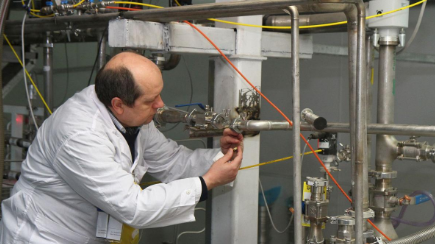Iran has sped up production of enriched uranium to a point where it could have enough for a nuclear weapon within months, according to the United Nations’ atomic watchdog.
The latest report from the International Atomic Energy Agency (IAEA), which monitors the country’s nuclear programme, says it now has 17.7kg of uranium enriched to 60 per cent purity, one level below weapons-grade. That is up from 10kg at the time of the last report in August.
That amount could produce about 10kg of uranium enriched to 90 per cent, the level required for a nuclear weapon. About 20kg is enough for a bomb, and the speed at which enrichment is progressing suggests that quantity could be reached within a few months.
The finding will add urgency to talks on the future of the nuclear programme and American sanctions on Iran, which are due to resume at the end of the month.
Diplomats optimistic about resuming the deal struck by President Obama with Iran in 2015 and abandoned by President Trump three years later hope Iran’s nuclear activity is just building a bargaining position.
However, Iran’s newly-elected President Raisi has coupled speeding up the programme with making ever greater demands on the United States, at a risk of collapsing the talks entirely.
Under the deal Iran agreed to restrict enrichment to 3.5 per cent, the level required for most civilian uses, such as generating nuclear power. When Trump withdrew from the nuclear deal in 2018, Iran held off from breaching its side at first but in January this year announced it was recommencing enrichment to 20 per cent, the level reached before 2015. Enriching from 60 per cent to 90 per cent is the easiest and quickest part of the process.
Since January it has accelerated both the quantity and level of enrichment, despite Biden’s victory in the US presidential election last year, which came with a promise to re-enter the deal.
Talks to do so were far advanced when Raisi, a hardliner, won Iran’s own presidential election in June, and put them on hold.
Since then he has said he will refuse to allow his negotiators to discuss reapplying restraints on the nuclear programme until the US lifts all sanctions it has imposed on Iran since Trump’s decision — including those applied over non-nuclear issues.
Biden says he will return to the deal as it was agreed in 2015 but wants assurances that the talks will lead on to broader negotiations about Iran’s role in the Middle East. The Republican party and some Democrats are concerned that releasing more money into the Iranian economy will allow it to spend more on militia activity across the region.
Biden also wants talks on Iran’s ballistic missile programme, a particular concern to US allies in the Gulf, who are hostile to Tehran.
A joint statement by the US and the Gulf co-operation council yesterday accused Iran of “aggressive and dangerous policies” and urged it to take advantage of the resumed talks to “prevent conflict”. “Iran’s support to armed militias across the region and its ballistic missile program pose a clear threat to regional security and stability,” it added.
Rafael Grossi, the head of the IAEA, is due to visit Iran on Monday. He is trying to persuade Tehran to allow full access to the closed circuit television monitors inspectors previously used to verify their assessments of the nuclear programme, which the authorities have blocked.








































admin in: How the Muslim Brotherhood betrayed Saudi Arabia?
Great article with insight ...
https://www.viagrapascherfr.com/achat-sildenafil-pfizer-tarif/ in: Cross-region cooperation between anti-terrorism agencies needed
Hello there, just became aware of your blog through Google, and found ...